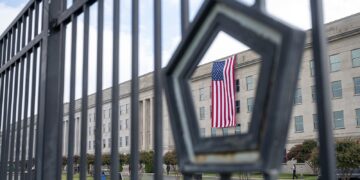April 4, 2024
75th NATO anniversary should mark a rethink of the military alliance
FOR IMMEDIATE RELEASE:
April 4, 2024
Contact: press@defensepriorities.org
WASHINGTON, DC—Today, on the 75th anniversary of the founding of NATO, Secretary of State Antony Blinken said that Ukraine will eventually join NATO. Defense Priorities Fellow Christopher McCallion issued the following statement in response:
“The 75th anniversary of NATO highlights the historical anomaly of a military alliance lasting three-quarters of a century. This is a sign of longstanding obsolescence, not of continuing vitality.
“This deviation from the historical norm is even more striking given that the key conditions which gave rise to the alliance have not been in effect for nearly half of its existence. The power of the Russian Federation pales in comparison to that of its predecessor, the Soviet Union, and while industrialized Europe was devastated in the immediate wake of World War II, it has long since rebuilt its economic capacity—and with it, its latent independent military potential. European members of NATO possess more than enough combined material capability to balance and deter Russia, an adversary which has not been able to decisively defeat one of the poorest states on the continent after more than two years of costly fighting.
“The U.S. role in NATO ultimately comes down to its commitment to use nuclear weapons—and thereby risk national suicide—to deter a Russian invasion of the industrialized core of Europe. The post-Cold War expansion of NATO to include the former states of the Warsaw Pact was, in George Kennan’s words, ‘a fateful error’ that simultaneously undermined the credibility of the alliance while souring relations between post-Soviet Russia and the West, setting them on a course that has reached a disastrous culmination in Ukraine.
“Secretary of State Antony Blinken today reiterated his conviction that Ukraine will someday join NATO. This move would be reckless and further undermine the credibility of the alliance, as the United States and its European allies have already shown they are not willing to fight for Ukraine when its national survival is at stake.
“Some who celebrate this anniversary misinterpret the alliance as being the guarantor of trans-Atlantic economic, political, and cultural ties. The truth is almost certainly the inverse. The United States can steadily remove its military presence from Europe and shift security burdens to its wealthy allies while retaining the strong bonds of friendship and cooperation that benefit both sides of the Atlantic.
“Europeans are rightly nervous about the future of the alliance. It is unwise for Europeans to outsource their security to the United States when the U.S. has higher priorities at home and in Asia. If the United States scaled back its presence on the continent—and thereby European reliance on U.S. military power—European leaders would have far greater incentive to make good on their stated intention to pursue ‘strategic autonomy,’ which would be better for both Europe and the United States.”
More on Europe

Featuring Jennifer Kavanagh
July 14, 2025

Featuring Dan Caldwell
July 13, 2025

By Geoff LaMear
July 11, 2025
Events on NATO






